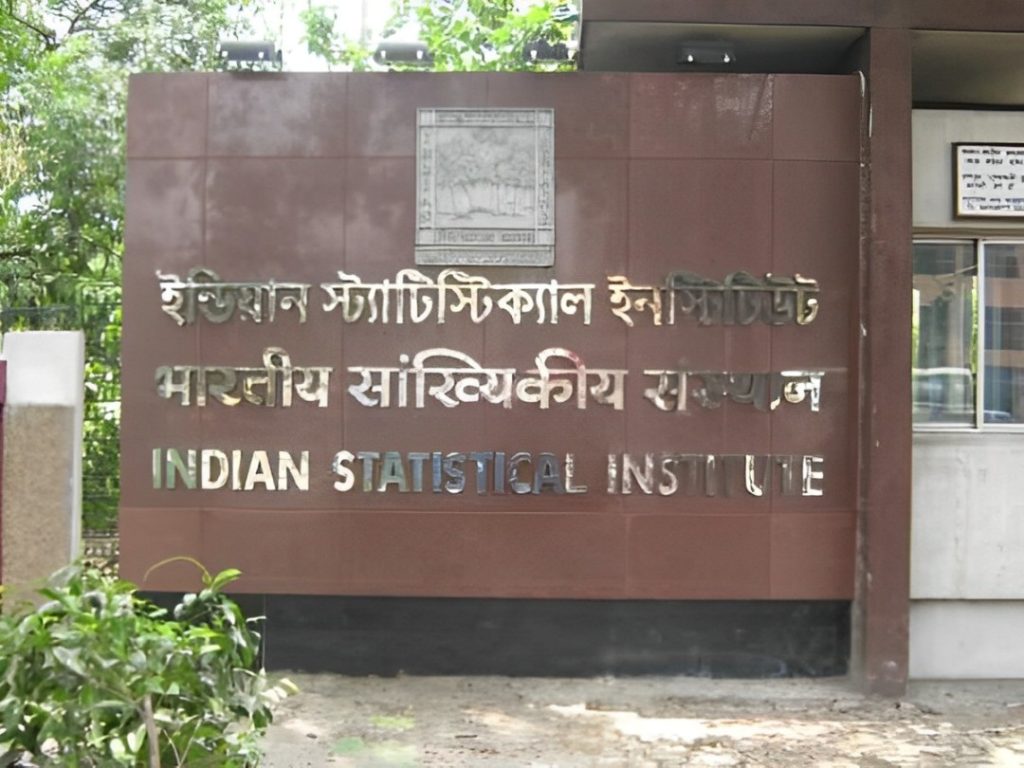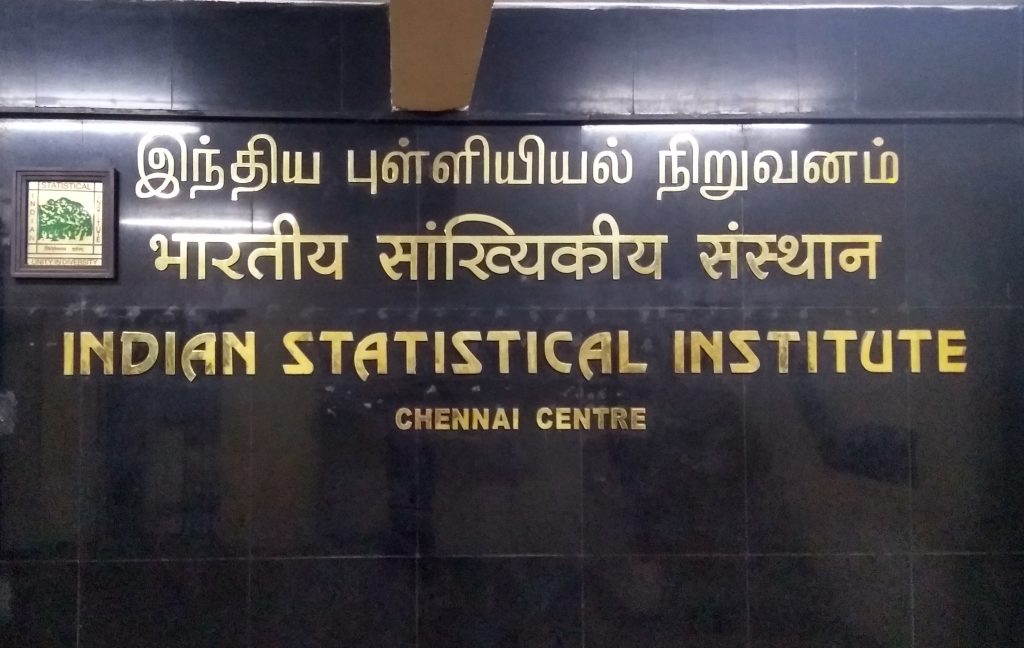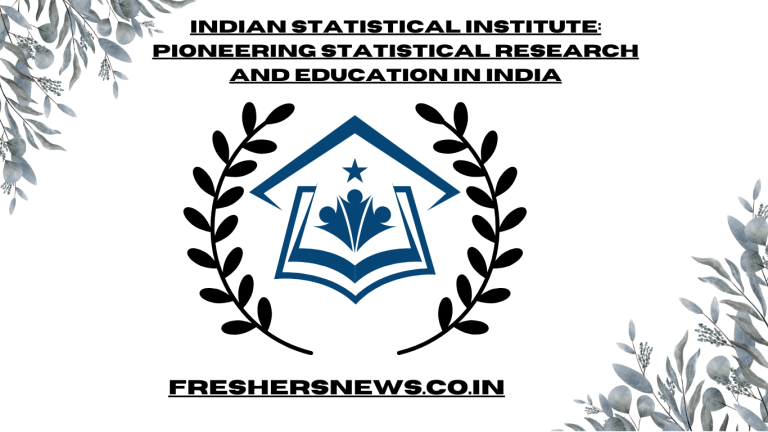Introduction
The Indian Statistical Institute (ISI) remains a beacon of greatness in India’s statistical research, education, and application. Laid out in 1931 by the famous analyst Prasanta Chandra Mahalanobis, ISI plays had a critical impact in molding the scene of measurements and related disciplines in the country. Throughout the long term, it has made binding commitments to different fields, including arithmetic, software engineering, financial matters, and sociologies. This paper investigates the experiences, accomplishments, and effects of the Indian Factual Foundation in advancing measurable science and encouraging advancement in India. We are discussing the Indian Statistical Institute: Pioneering Statistical Research and Education in India.
We are discussing the Indian Statistical Institute: Pioneering Statistical Research and Education in India:

History and Establishment
The foundations of the Indian Statistical Institute can be followed back to the Statistical Laboratory, which was set up by Prasanta Chandra Mahalanobis in 1920 at the Presidency College, Kolkata. Perceiving the developing requirement for measurable aptitude in India, Mahalanobis imagined an establishment committed to factual exploration, preparation, and application. In 1931, his vision turned into a reality with the foundation of the Indian Statistical Institute in Kolkata, with the backing of prominent researchers like C. R. Rao and S. N. Roy.
Mission and Objectives
Since its initiation, ISI has been focused on progressing Statistics and its applications to serve society. The Institute’s central goal spins around four fundamental targets:
1. Leading state-of-the-art research in measurements and related disciplines.
2. Giving excellent schooling and preparing factual hypotheses and strategies.
3. Teaming with government offices, enterprises, and global associations to resolve certifiable issues through measurable investigation.
4. Dispersing information and advancing mindfulness about the significance of measurements in navigation and strategy plans.

Academic Programs
ISI offers many undergraduate, postgraduate, and doctoral academic programs. The organization‘s lead program is the Bachelor of Statistics (B.Stat) and Bachelor of Mathematics (B.Math) programs, which give areas of strength for a factual hypothesis, techniques, and applications. At the postgraduate level, ISI offers expert projects in Measurements, Arithmetic, Software engineering, and Quantitative Financial, among others. The foundation likewise has a lively doctoral program, drawing in skilled specialists from India and abroad.
Research and Innovation
Research is at the core of ISI’s exercises, with employees and understudies participating in meaningful examinations across different areas. The foundation has made critical commitments to hypothetical insights, likelihood hypothesis, AI, information science, and econometrics, among other regions. ISI’s exploration yield is generally perceived and has prompted various distributions in renowned diaries and gatherings. Besides, the foundation supports interdisciplinary joint efforts, encouraging advancement at the convergence of insights, arithmetic, software engineering, and different disciplines.
Focuses of Excellence
ISI houses a few particular communities and exploration bunches devoted to explicit areas of study. These incorporate the Factual Quality Control and Tasks Exploration Unit, the Applied Insights Unit, the PC Vision and Example Acknowledgment Unit, and the Machine Knowledge Unit, among others. These foci are centers for state-of-the-art exploration, preparation, and consultancy administrations, tending to different difficulties in the scholarly world, industry, and government.
Worldwide Collaborations
ISI effectively teams up with driving foundations and associations all over the planet to advance logical trade and cooperation. The establishment encourages global participation in measurable science and related fields through joint exploration projects, educational organizations, and trade programs. These coordinated efforts improve ISI’s examination abilities, add to worldwide information sharing, and limit working in measurements and information science.

Influence on Society
The Indian Measurable Organization significantly affects society through its examination, instruction, and effort drives. By preparing gifted analysts, mathematicians, and information researchers, ISI has added to limit working in India and, at some, engaging people with the apparatuses and information to handle complex issues. Besides, the establishment’s exploration discoveries and consultancy administrations have informed strategy choices, developed strategic policies, and worked with proof-based dynamics in different areas, including medical care, money, horticulture, and administration.
Effort and Public Engagement
ISI focuses on advancing mindfulness and comprehension of measurements among the population through effort and public commitment exercises. The establishment arranges studios, workshops, and public talks on subjects connected with measurements, information science, and their applications. It likewise teams up with schools, universities, and local area associations to acquaint understudies and instructors with the enchanting universe of measurements and rouse people into the future of analysts and information researchers.
Difficulties and Future Directions
Despite its numerous accomplishments, ISI faces a few difficulties, including financing imperatives, foundation limits, and the need to adjust to quickly developing mechanical and cultural changes. The organization should establish and differentiate its examination plan to address these difficulties, reinforce its associations with industry and government, and upgrade its endeavors to draw in and hold ability. Besides, ISI can be influential in resolving cultural issues like deprivation, disparity, and supportability through interdisciplinary examination and coordinated effort.
FAQs
What is the Indian Statistical Institute (ISI)?
The Indian Measurable Foundation (ISI) is an academic organization and examination establishment settled in Kolkata, India. It was laid out in 1931 by Prasanta Chandra Mahalanobis and is eminent for its commitment to measurable exploration, schooling, and application.
What scholastic projects does ISI offer?
ISI offers various scholastic projects, including undergrad projects like the Bachelor of Statistics (B.Stat) and Bachelor of Mathematics (B.Math). At the postgraduate level, ISI gives expert projects in Measurements, Arithmetic, Software engineering, and Quantitative Financial aspects, and that’s only the tip of the iceberg. Also, ISI offers doctoral projects for cutting-edge research in factual science and related fields.
What research regions does ISI center on?
ISI conducts research across different spaces, including hypothetical insights, likelihood hypothesis, AI, information science, econometrics, and applied measurements. The foundation supports interdisciplinary coordinated efforts and houses particular focuses and research bunches committed to explicit areas of study, for example, factual quality control, activities research, PC vision, and example acknowledgment.
What is ISI’s effect on society?
ISI significantly affects society through exploration, instruction, and effort drives. Via preparing talented analysts, mathematicians, and information researchers, ISI has added to limit assembling and engaging people with the apparatuses to handle complex issues. Also, ISI’s exploration discoveries have informed arrangement choices, further developed strategic approaches, and worked with proof-based dynamics in different areas, including medical care, money, agribusiness, and administration.
How does ISI draw in the worldwide community?
ISI effectively teams up with driving foundations and associations all over the planet to advance logical trade and cooperation. ISI encourages global participation in measurable science and related fields through joint exploration projects, scholarly associations, and trade programs. These coordinated efforts upgrade ISI’s examination abilities, add to worldwide information sharing, and limit working in measurements and information science.
What are the difficulties faced by ISI?
Despite its numerous accomplishments, ISI faces difficulties like subsidizing requirements, foundation limits, and adjusting to quickly developing mechanical and cultural changes. To address these difficulties, ISI should keep advancing, expand its exploration plan, reinforce organizations with industry and government, and improve outreach endeavors to draw in and hold ability.
How could people draw in with ISI?
People inspired by insights, math, software engineering, and related fields can draw in ISI through different means. This incorporates seeking after-school projects at ISI, participating in studios, classes, and public talks coordinated by the organization, working together on research projects, and getting to assets and distributions created by ISI.
What is ISI’s vision for the future?
ISI means continuing to push the limits of information, encouraging development, and benefitting society. With its obligation to greatness and interdisciplinary cooperation, ISI looks to lead India towards becoming a worldwide center point for measurable science and information-driven development.
Conclusion
The Indian Statistical Institute remains a testament to the vision and devotion of its originators and the innumerable researchers, specialists, and understudies who have added to its prosperity throughout the long term. As India’s head foundation for factual examination and instruction, ISI keeps pushing the limits of information, cultivating development, and having a beneficial outcome on society. With its rich inheritance and obligation to greatness, ISI is strategically set up to lead India’s journey towards becoming a worldwide center for factual science and information-driven development.

